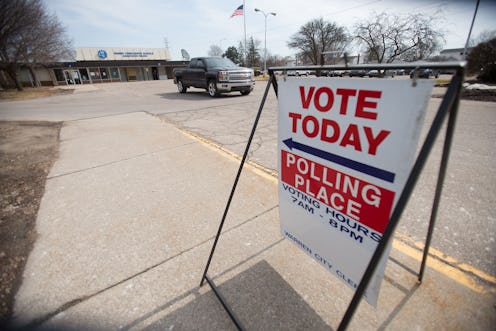News
One Big Way To Help This Election Season
If you're a Muslim American, or hell, a Muslim living anywhere around the world, this is a scary moment in American politics. With tensions flaring over yet another high-profile terrorist attack on a Western democracy ― this time in Brussels, Belgium ― the Republican presidential field is now engaged in the usual march of hard-line, discriminatory policy proposals, and subsequently, self-defeating stigmatization of Muslims and their communities. So, if you're looking for ways to help this election season, here's a good one: how to help Muslim Americans register to vote.
Make no mistake, this is a time when countless members ethnic and religious minority groups ― black Americans, Latino Americans, and yes, Muslim Americans ― are going to want to head to the polls. At this rate, it looks as though the Republican nominee could well be Donald Trump, who's sailed to a modest-yet-sufficient level of support among the GOP base, partially by stoking racial resentment, xenophobia, and fear. While he might yet be stopped before seizing the Republican nomination, he's already come much further than almost anyone could've predicted this time last year. Too close for comfort for many people, no doubt.
So, how can you help out?
When it comes to getting more people on the rolls, there's one great answer that requires some diligence and organization, but it's still well within most people's abilities: a good, old-fashioned voter registration drive! A prime way to help ensure that some of the people most targeted by Trump's rhetoric ― to say nothing of his closest GOP rival Ted Cruz, who's nearly no better ― get to make their voices heard come November.
The rules for voter registrations drives actually vary somewhat from state-to-state, which can be consequential ― it's of the utmost importance that if you want to take the initiative and sign people up to vote, you follow all the laws and requirements in your respective state. After all, you'll be handling people's forms, and in some cases you'll be accepting legal liability as far as what happens to them.
In the state of California, for example, there's a hard deadline on turning over the filled-out forms from your drive. As the state's official elections website details, they must be either presented in person to a county elections official or the secretary of state, or mailed within three days. Many states have requirements like this on the books, ostensibly as a means to ensure that voter registration information forms aren't sitting around for days or weeks after being filled out ― the longer someone is hanging on to such sensitive documents, the higher the possibility of tampering, or so the logic goes.
If you're looking to organize a voter registration drive, whether going door-to-door, or even just setting up a table with a couple friends as volunteers, make sure you're staying within the four corners of the law wherever you are ― the Brennan Center for Justice is an invaluable resource on this topic, with information about voter registration drive rules in all 50 states. Needless to say, if you're looking specifically to help Muslim Americans get registered, then you'll want to run any voter registration efforts in heavily Muslim communities, or shared gathering places ― outside a local mosque, as an obvious example.
Registering new voters at religious centers is entirely legal, provided as always that it's a non-partisan affair, so if you'd like to set up a table to try to register some new voters, that's a very good place to start. Make sure you always get the necessary permission, though, especially if you'd like to set up near a place of worship. The Council on American-Islamic Relations (CAIR) has some helpful guidelines to get started.
Also, although it's somewhat secondary to the main goal of getting new voters on the rolls, it's hugely important that you inform yourself and others about any voter ID laws in your state. These highly controversial laws ― deemed voter suppression by their critics ― have popped up all across the country, typically having a disproportionate impact on minority and low-income communities. It's essential for anyone who wants to vote to bear them in mind.
As it stands, 33 states have some form of voter ID law in effect for 2016, according to the National Conference of State Legislatures: Alabama, Alaska, Arizona, Arkansas, Colorado, Connecticut, Delaware, Florida, Georgia, Hawaii, Idaho, Indiana, Kansas, Kentucky, Louisiana, Michigan, Mississippi, Missouri, Montana, New Hampshire, North Carolina, North Dakota, Ohio, Oklahoma, Rhode Island, South Carolina, South Dakota, Tennessee, Texas, Utah, Virginia, Washington, and Wisconsin.
The exact requirements vary state-by-state, so be sure to check what documentation you'll need on election day, and get active about informing other people in your community. There's no denying that some state governments ― mainly, Republican-run ones ― have been trying to make voting harder in recent years. So let's not let them win, yeah?
